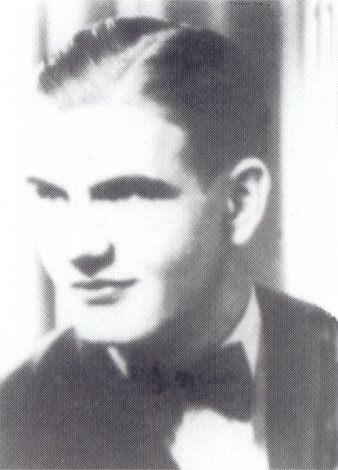
Stanislaw Sieradzki ,
born on September 14, 1921 in Ilowo near Dzialdowo
Home Army sergeant Cadet a.k.a. "Swist" ("Whistle")
Home Army union "Radoslaw"
section "Felek" company "Rudy" battalion "Zoska"
The Witnesses' Uprising Reports
The scouting fate

Stanislaw Sieradzki ,
born on September 14, 1921 in Ilowo near Dzialdowo
Home Army sergeant Cadet a.k.a. "Swist" ("Whistle")
Home Army union "Radoslaw"
section "Felek" company "Rudy" battalion "Zoska"
I am a son of the land of Dzialdowo where I passed my exam for the certificate of secondary education before the war and had been a scout since 1932. In the year 1939 I was a captain of the 75th Pomeranian Scouting Team named after Prince Jozef Poniatowski. Just before the war outbreak - 7 or 6 days before -I was decamping a scouting camp in the area of Lubawa, not far away from the then border with the Eastern Prussia. I was a commander of this camp. And I must tell you that we were able to organize scouting bonfires just over the border and the Germans would listen to them eagerly. At that time I felt that some disaster was approaching our country, our nation. Observing behavior of some Germans, one could conclude that they were arrogant and ready to oppression. I was not able to take my camp property to my house in Dzialdowo. I was evacuated to a town of Wlodawa on the Bug river and my whole scouting property disappeared there on September 17, 1939, when the Red Army entered our land.
While coming back do Dzialdowo, wearing a scouting uniform, I was brought to a stop by German soldiers nearby Gora Kalwaria, having gone through the Vistula river. I was put in a prison in Gora Kalwaria - in orchards where trees were border points for particular groups of captives. Then, I was driven to the area of Krolewiec to a captive camp. After 5-6 months some German officer found me there. He asked what kind of weapon is represented by my uniform. I answered that it was not any kind of weapon but a Polish scout's uniform.
- "So what are you doing in a captive camp?"
- "Ask those who invited me here."
Soon afterwards I was thrown from this camp for labour, firstly agricultural one. In June1941, during my first escape to Warsaw, I was caught by the Gendarmerie at a railway station in Olsztyn, then Allenstein. Thanks to my knowledge of the German language I did befool them. I stated that I was not escaping to Poland but came from Poland and was looking for a job. I was so lucky that the Germans believed me and gave me a job in a city gas-works In Olsztyn - till June 1942. At that time my second escape was successful. I appeared in Warsaw and in August 1942 I was given a honourable proposal to become a scout. I replied that I did not have to start as I had been a scout since 1932. And in such a way I started my activity in the Grey Regiments. I found myself in Wola troops.
On the 63rd anniversary of the Arsenal Action I would like to tell you about the setting free of Janek Bytnar a.k.a. Rudy. At the time when Janek was arrested we would live a normal life of clandestine Grey Regiments scouting. It must be reminded here that a decision of the scouting' going underground into conspiracy was made on September 27, 1939, a day before Warsaw's capitulation whose date was September 28. In the Nowakowskiego street the Board of the Polish Scouting decided that scouting would start the conspiracy activity. Among the people present during the meeting then were the following: Aleksander Kaminski, Stanislaw Broniewski and Helenka Danielewicz. There was also an active scout from Poznan Florian Marciniak who soon would be recognized under a pseudonym "Nowak". So it happened. Scouting went to the conspiracy and 6-7 months later it adopted a cryptonym Grey Regiments. This name is connected with a colour of girls' uniforms and this name was proper - as these regiments were numerous.
The Grey Regiments in Warsaw functioned in four troops and the structure of the whole organization did not differ from the former one at all. The Headquarters was Pasieka (Apiary), regiments were Ule (Beehives), troops were Roje (Bevies), squads were Rodziny (Families). Under such cryptonyms the underground scouting functioned. There were four bevies in Warsaw. The most energetic was certainly Bevy "CR", i.e. Centre, whose commander was Tadeusz Zawadzki a.k.a. "Zoska". The second troops was "Sad", i.e. Mokotow. Its commander was Janek Bytnar a.k.a. "Rudy". Wola troops into which I was honoured to belong was called "WL" and its commander was Antek Kopalka a.k.a. "Antek from Wola". And finally, the fourth troops was "BR" - Praga, commanded by Henryk Ostrowski a.k.a. "Henryk".
Those four troops of the Grey Regiments were doing excellent job. Of course I could not participate in all the actions and activities of the Beehive Wisla" (the Warsaw organization) but I met many, many people, with many I could associate personally and with many I experienced how faithful we were to our oath in the Grey Regiments.
At home by the Zelazna street, just next to the Srebrna street, in the attic, I put my two fingers on a scout cross which was lying in a hand of my captain Jurek Zakrzewski a.k.a. "Wasik" and I repeated, "I am vowing - on your hands - to be on duty in the Grey Regiments, to obey organization orders, to keep secret and not to shrink from the sacrifice of life."
This last part says everything - it is understandable and thrilling. I saw during the occupation how the boys were faithful to this oath, especially my friends who died during the Warsaw Uprising, often in order to save a man.
Wola troops was not as active as Praga, Centrum or Mokotow were but several wonderful people rose from it, the ones whom I saw during the Warsaw Uprising in a heroic action.
On February 14, 1943 the commander of Praga troops Henio Ostrowski got married with Walentyna Hornowna. They chose common life, wanted to be happy with it but their joy was possible only for one month. When they were already married, some relative from the Kielce land went to the Osiecka 31 street where they lived. He wanted to make a huge impression on Henio by the way he was active in conspiracy. It was very improper, now I think so, as you should not have done anything like that. The underground soldier should not have shouted so loud, should not have boasted that he was fighting with the Germans, that he had a gun.
This relative challenged Henio to state that he was active in conspiracy, as well. At the time Henio was preparing materials for an action of blasting a bridge in Czarnocin and those materials he had hidden in a small stool with a part able to open.
- "Have a look, we are acting, too - the bridge will explode."
This resulted in a tragedy. The relative was coming back to a railway station, somewhere in Powisle and was stopped by gendarmes. They saw his gun and the boy found himself in Pawiak at the Gestapo. As a result, the gendarmerie and the Gestapo appeared In the Osiecka 31 street. They knew where the stool stood and knew how to open it. They took both spouses. Wala were taken to Oswiecim and Henio was under a terrible investigation in the Aleja Szucha in Warsaw. Henio could foresee that a tragedy might happen in each moment. Unfortunately, he forgot about that on March 17, 1943. In his pocket he had a small note-book in which there was a small note - Al. Niepodległosci 159 apt. 63.
And the Germans did not even ask Henio what this address meant. This address was a department of a young man, Janek Bytnar a.k.a. Rudy, a commander of the Grey Regiments' troops.
On March 23, 1943 six Gestapo men arrived in the department in Aleja Niepodległosci. They took all people out: Mr. Stanisław Bytnar - the father and Janek - the son. Fortunately, Mrs. Zdzisława Bytnar, Janek's mother, was absent at home that night. Similarly, five years younger Danusia, Janek's sister, who - as the only one among this group of people - is still alive. Both women avoided the tragedy. Danusia was at her teacher's in the Hoza street at the clandestine teaching. She missed the police hour, stayed for a night, and this saved her. Mrs. Bytnarowa was in the area of Nowe Miasto where she would teach children at a primary level. There she got to know about the disaster that had happened at their home. Danusia, on the day when two men had been arrested, were coming back home to the apartment on the second floor. Good neighbours from the first floor invited her to their apartment and warned about what had happened: at night the Germans took your father and Janek. At home two Gestapo men are sitting and waiting for the next victims. Do not go upstairs, Danusia.
I don't have to tell you what this girl felt. Crying, he went to Tadeusz Zawadzki, the commander of Srodmiescie troops and a friend of Janek Bytnar from the Batory Secondary School. Those two boys were very good friends. Danusia knew about this friendship. She ran to the Koszykowa street to a building of the Warsaw Polytechnic where Mr. Jozef Zawadzki, the father of Tadeusz and a lecturer at the Polytechnic, lived with his family. She knocked at the door, professor Zawadzki let her in. When she was in the hall, she burst into tears. I can't imagine today what this girl must have felt then.
Tadeusz, who was in his small room, heard crying. He went to the hall and took Danusia in his arms. Still crying, she told him about the tragedy that had happened to her family. Tadeusz, yes, I can say that, only to calm the girl down, grabbed her arms, shook them and said,
- "Danka, stop crying, we will save him even today."
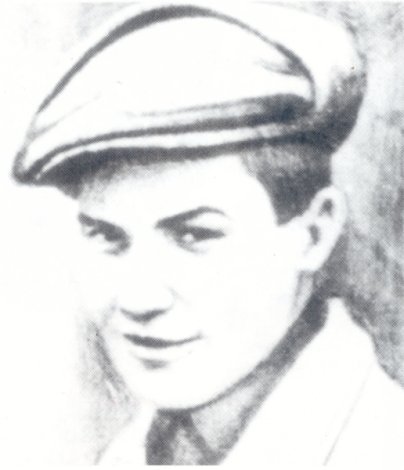
Tadeusz Zawadzki a.k.a. "Zo¶ka"
Tadeusz did not know where "Rudy" was and how to save him. Even if he was in Pawiak, as all our patriots, it was not so easy to save anybody from this Pawiak. But he wanted to buoy her up. Justly.
What followed this thought of Tadeusz was a deed leading to an action of setting Janek free. At that time a young man, the son of the headmaster of the hospital in the Nowogrodzka street, named after the Infant Jesus - Konrad Okolski a.k.a. "Kuba" turned to Tadeusz. This man, "Kuba", my later troop commander in the "Zoska" battalion about 4-5 weeks before arresting Janek had been arrested himself and was a Pawiak prisoner. He had been caught in Saska Kepa during some shooting in which he did not participate. The Germans did not have any direct evidence against him, so he was treated in a better way. Gold and brilliants offered to proper people by doctor Okolski helped and "Kuba" had been released before the arresting of Janek.
This was the first gesture offered by the fate which allowed to think seriously about the Arsenal action. "Kuba" had been transported for the investigation from the Pawiak prison in the Dzielna street to the Gestapo building in Aleja Szucha 23, where the Ministry of the National Education is situated now. "Zoska" together with "Kuba" followed the route of a car transporting prisoners from Pawiak to Szucha four times forward and backwards not later that on March 23, 1943. "Zoska" would act on the first day after the arresting of "Rudy."
He associated himself with the route of a prison-van and was looking for a place in which one could undertake such a serious action, the first one in Warsaw. An armed action on such a scale had not been experienced by Warsaw yet. That is why a proposal of doing it needed thinking it over and getting an approval of a commander of the Home Army Headquarters. Major Jan Kiwerski a.k.a. "Oliwa", "Dyrektor", "Lucki" listened to the proposal of "Zoska" and said one word only,
- "Do it!"
Tadeusz heard this word on March 26 when Major came back from a Home Army units' inspection. Everything that "Kuba" said was very useful in the action's preparation. "Zoska" was acting very definitely and quickly. He knew from the experience of "Kuba" how sad and painful moments his friend Janek Bytnar Rudy" was experiencing during the investigation in the Pawiak prison.
At 9 o'clock in the morning prisoners would be taken by a prison-van to Pawiak. There were 25 people on a platform. Sitting on desks, they were allowed to look ahead only, at the direction of a cab. If they looked behind, they could be shot by one of two Gestapo men that were sitting in a prison-van by an entrance to a platform. Apart from a driver two other Gestapo men were sitting in a cab. So, four Gestapo men and a driver as a fifth.
The crossroad and a complicated link of Bielanska street with Dluga street and Nalewki street in the direction of the Dzielna street seemed to be the best place for undertaking the action.
A rushing prison-van, going from Aleja Szucha across Aleje Ujazdowskie, Krakowskie Przedmiescie, the Krolewska street, Marszalka square, the Bielanska street to the Dluga street had to brake there. And "Zoska" decided to use this moment in order to hit the prison-van successfully.
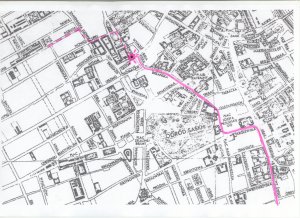
A situational plan of the Arsenal Action
"Zoska" prepared a good team in order to undertake such an action. He chose 28 boys among whom everyone knew Janek "Rudy" personally and everyone was ready not to shrink from the sacrifice of their lives. All people, 28 chosen ones, became acquainted with the action and a task was given for each boy.
The most important part of these attacking young people was a group of attack. An organizer "Zoska" Tadeusz Zawadzki commanded this group to which he chose 13 boys who were ready to everything. These 13 men were divided into four sections attacking a car. All four sections were situated along the Nalewki street, from the Dluga street to the Dzielna street, till a curve in the direction of Powisle.
Section one was commanded by Janek Rodowicz a.k.a. "Anoda". He had 4 boys, including Tadeusz Chojko. These boys' task was to throw bottles with petrol onto the prison-van. Half-liter bottles were sticked with envelopes with chemicals that, after breaking the glass, would unit with petrol, which resulted in self-burning. It appeared that this section had the most serious and the most important task during the action.
"Zoska" foresaw that something could fail, that nervous boys could threw bottles too far away or too nearby and a conscious driver could escape further into the Nalewki street. A few meters away the next three-person-section called "Sten-1" stood, commanded by Maciej Bittner, the son of a pre-war Polish Army General. Maciek Bittner, as well as all action participants, had got a gun. This section was armed with a machine gun Sten, produced In England, which we had thanks to the drops. The first section had a task of shooting the crew of the prison-van but only at the right angle to the direction of driving. Otherwise, the gun fire could touch the heads of prisoners sitting on a platform. Caution - The boys got an order to do it very precisely.
But "Zoska" foresaw that here as well could appear some unexpected obstacles, for instance a Sten damage, and the prison-van would escape further on. Then it would approach the next section "Sten-2" made up of 3 people, commanded by Jurek Gawin a.k.a. "Slon". "Slon" was given a task similar to the previous section, with possibility to shoot to the cab at another ankle. Tadeusz assumed that prisoners, after first explosions of bottlers, grenades and shots, would look for a shelter on a prison-van's floor. If so, the boys could risk and shoot over prisoners' heads.
If something went wrong here, the fourth three-person-section, commanded by Maciej Aleksy Dawidowski a.k.a. Alek", stood at the turning into the Dzielna street.
These 13 boys were waiting for a signal. This signal was to come from the people who knew this prison-van. An observer "Kuba" stood at the corner of the Bielanska street by the Theatre Square. "Kuba" while seeing the oncoming prison-van, having made sure that it was the prison-van and not, let's say, a car with margarine, was to cross the Bielanska street in the place where today a church for creators is situated. On the other side Witek Bartnicki a.k.a. "Wiktor" was to cross the Bielanska street. By taking off his head-dress he gave a signal for the action commander who stood by the Dluga street, near Tadeusz. Then Tadeusz was to give a sign to start the action, give weapons, and take machine guns.
There was one another possibility. Janek "Rudy" might not have come back from the investigation to the prison. There occurred cases that a battered unconscious prisoner was thrown into a cellar in Aleja Szucha. Having spent a night there, if he became conscious, they would be brought upstairs again in order to continue the investigation. It was an additional complication. Someone must have assured that on the day chosen for the action, March 26, Janek would be taken to the prison-van coming from Szucha, after the whole-day-long investigation.
It must have been proved. It was a task for a Wedel sweet factory employee Zygmunt Kaczynski who became the chairman of the Warsaw City Council after the war. Zygmunt Kaczynski received from the factory's situated in the Zamojska street manager an agrement to sell chocolate. So "Wesoly" allowed himself to offer the Germans chocolate even in Aleja Szucha. "Zoska" got to know about that and gave him a task:
- "Listen, you have to see what is happening with "Rudy" and whether he is going to be put in the prison-van and transported to the Pawiak prison on March 26".
So, Zygmunt was walking along the halls in Szucha, carrying a suitcase. As a matter of fact, having knocked at the door, he entered a room number 228 from which he had heard strokes and groans. Here you need my explanation. The investigation of "Rudy" was being carried out by two Gestapo men, Lange and Schultz who were torturing Janek for 4 days. They were beating him, one by means of an oak stick, and the second by means of a chain. When he fell on the floor, or while standing, the Germans would jump onto him from a desk or would kick him on the stomach or ribs. As a result, Janek had six ribs broken, one of them went through skin, below the right arm. Moreover, on the last day of the investigation, on March 26, Janek "Rudy" experienced the most cruel things which , being a human, I cannot imagine. One of the Gestapo men, Lange or Schultz, would take Janke's fingers one by one, and hammer a nail under finger-nails.
- "Confess - and we will let you go home."
Nevertheless, "Rudy" did not say anything and did not shrink from the sacrifice of life. During these four difficult cruel days he did not tell the Germans anything. Anything. Unfortunately, the Germans had found incriminatory materials under coal in his cellar in Aleja Niepodległosci. Thus, Janek could not explain that he did not belong to the organization and did not know anything. But he did not betray this organization and its people.
March 26 came. Zygmunt "Wesoly" was walking with chocolates in Aleja Szucha, on the second floor. He entered the room inside which he had heard groans. He saw Janek "Rudy" lying on the floor and the two Germans standing over him, with a hammer and nails. He said "I'm sorry." And wanted to leave."
- "No, no, it's only an industrial accident, you know. Was haben Sie? What have you got?"
"Wesoly" opened his suitcase and offered them chocolates. He was doing that not for the first time, but never during the investigation. The Germans chose those chocolates, this time for free, exceptionally. The Germans got the chocolates for free due to the fact that he had entered that room. As a reward, Zygmunt knew the situation perfectly. Janek "Rudy" was beaten, covered with blood, with a swollen face and hair agglutinated with blood. He looked awfully.
Then Zygmunt saw from a window on the second floor a moment when they were putting unconscious Janek on the prison-van's floor, on a blanket. He had to give this message as soon as possible at the place of the Arsenal action for the boys to realize that they had an aim ahead of them and could set Janek Bytnar "Rudy" free.
In the Dluga street number 36/38 there was a small cafe - a Polish and trustworthy one. Andrzej Wolski a.k.a. "Jur had a duty there by the phone. He was waiting for a phone message that was to be given him by Zygmunt Kaczynski. Zygmunt, having made sure that Janek had been put in the prison-van, had a task to leave the Gestapo building in Aleja Szucha and go to a Polish, as well a trustworthy one, café in the Koszykowa street number 6 and give the message about Janek's approaching by phone, too. The message was to be coded, of course. He was to say that sacks with sugar were being transported to the Wedel factory, which meant that Janek "Rudy" was among the transported prisoners.
Andrzej Wolski had a little adventure. When a telephone rang, an owner wanted to make a scene. "Jur" pulled out his gun then. "Sir, do not interrupt." The owner calmed down. Fortunately, it was a good Polish man, a patriot, as it turned out later on. Zygmunt was going to go at the direction of the Koszykowa street but thought that it could not be a good idea. The car would be faster and could pass the place of the action before he would phone. He had to pass on the message more quickly, now, immediately!
Leaving the Szucha building, he stopped by a guard, as he had 4 chocolates left in his suitcase. He opened it.
- "Mr. Wachmeister, maybe you - that's all, I don't have anymore."
The gendarme certainly grabbed these chocolates and packed them.
- "How much do I pay?"
- "It's a present, Mr. Wachmeister, Today I have made a good deal but, simultaneously I must come back here today with chocolate, with a full suitcase. The officers upstairs have asked me to come back with a new stock of chocolate. And I must give this message that I'm coming to the factory and tell them not to close the store-room with chocolate."
Wachmeister replied,
- "Go on, tell them."
Zygmunt phoned Andrzej staying in the Dluga street and started with words quite different that they might have been,
- "Boss, I would like to tell you that I'm coming back to the factory as I must take another stock of chocolate."
Andrzej was confused. Even now, while talking about that, he could not hide his irritation. What a boss? What a chocolate stock? He awaited different words. But, finally, Zygmunt said this as well,
- "Boss, by the way, I would like to tell you that sacks with sugar on a truck are coming to the factory. Thank you boss."
And he hang up. He did not need to run towards the Koszykowa street.
Andrzej left the cafe and approached the action commanders Stach Broniewski a.k.a. "Orsza" and "Zoska" Tadeusz Zawadzki. "Orsza" did command the whole action as, apart from above-mentioned 13 attackers, there were security groups from the direction of the Old Town by the Krasinskich Square, from the side of the Ghetto by the Przejazd street and from the side of the Theatre, created in order to counteract the Germans attacking from there if need be.
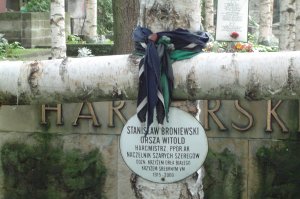
The tomb of "Orsza" in the Grey Regiments' quarters
No special security was needed from the side of Powi¶le because the section of Alek Dawidowski was security itself. And this section first attacked the Germans just before the beginning of the action. Some officer from Gestapo together with a woman left the Pawiak prison and was approaching Alek. He came nearer only to end his life. The boys did not shoot that woman. The section kept being on duty and the woman came back to Pawiak.
The car was coming, inhibited and turned right from the Bielanska street into the Nalewki street. At this curve a driver inhibited, of course. And at that moment bottles successfully thrown by the boys commanded by Janek Anoda fell on the car. One of the Germans, burning, left the cab. He jumped off the car and was shot while trying to escape. The driver lost control of a steering-wheel and was burning, leaning forward. A Gestapo man who was sitting next to the driver burnt, too. Two guards sitting at the entrance to a platform were left. One of them, sitting on the left side, was trying to escape, running towards the Przejazd street. Certainly, the boys from the section of Maciek Bittner shot him, so he did not escape far away. The boys were shooting to the Gestapo man sitting on the right side. Suddenly, one of the prisoners shouted, "Don't shoot, they are dead". The German was sitting, dead.
Our car, driven by Jerzy Zborowski a.k.a. "Jeremi", approached the prison-van. Eugeniusz Koecher, a forthcoming commander of the "Alek" platoon of "Zoska" battalion, ran towards the prison-van as the first. He lowered a tailgate, threw the dead German and uttered such words towards the prisoners,
- "People, compatriots, you are free. Run along the Dluga street at the direction of the Old Town."
Many of them were passing the contemporary museum.
Try to think what Tadeusz Zawadzki felt when all the prisoners jumped off the car and unconscious Janek "Rudy" was still lying on the floor. Near the cab, at the right side, in a corner, a shot prisoner was sitting. She was Mrs. Helena Siemienska, a sister of Tadeusz Zawadzki's mother. I don't need to say what this boy must have felt. It must have been a terrible experience. He was a commander of the attack section and coordinated such a huge action.
Some young woman left the car and she stated loudly that she would not be escaping. Her mother stayed in Pawiak and she wanted to come back there. When the action had finished, the Germans brought her back to Pawiak and shot her a few days later.
Janek "Rudy" was carried to our car, to "Jeremi". The boys put him at the back seat where seriously wounded Tadeusz Krzyzewicz a.k.a. "Buzdygan", was lying - hurt by a policeman in a stomach, he was brought to our car as the first wounded man. Afterwards, he was driven to the hospital.
After finishing the action, all the participants withdrew in the direction of the Old Town. Tadeusz got in the car to which unconscious Janek had been put. He sat next to the driver. And then Tadeusz saw the hand of Janek that was hanging over the floor. With black, broken fingers, it was only wavering. I don't need to say what "Zoska" must have felt at the time. He experienced tremendous moments then.
Battered Janek was transported into the Ursynowska street, to the apartment of Mr. and Mrs. Mirowski, the parents of "Oracz" and "Bolek". "Bolek" is Stefan Mirowski, the chairman of the Organization of the Polish Scouting (ZHP). After many years, in the 1990-ties Stefan participated in the Conference of the World Scouting in Oslo. Having heard that the Polish scouting was being welcomed to the international scouting, very moved, he had a heart attack. Mirowski came back from Oslo in a coffin.
While retreating from the Arsenal towards the Old Town Alek Dawidowski was hit by a missile, as well. In order to transport him, the boys halted some German car. They carried its driver, a Wehrmacht soldier, to a gate in the Długa street and "Alek" was successfully driven to Zoliborz. Later, doctors took care of him.
Doctor Andrzej Trojanowski was taking care of saved, ill and battered Janek "Rudy". This guardianship lasted for 4 days, from March 26 till March 30, 1943. The condition of Janek was fearful. Nothing predicted that this boy could be saved. Probably on the second day Doctor Trojanowski went to the hall where Tadeusz was sitting and told him this,
- "Zoska", the condition of Janek is hopeless. Both his liver and milt are crushed, six ribs are broken. The face is beaten, with blood on it. There is blood all over his hair. The only rescue can be to transport him to the hospital. Maybe there..."
It was understandable as nobody could save the ill person in such a condition at home in the Ursynowska street.
Due to this situation, on March 30 four boys lead by Stefanem Mirowski together with "Zoska" transported Janek to the hospital situated in the Plocka street, the trustworthy Polish hospital. Professor Manteufel was waiting for Janek there. The boys put Janek on a surgical table and sat on chairs in the hall, waiting for the results of first examination and decisions for subsequent treatment of Janek. After several minutes Professor Manteufel left the room and approached "Zoska". They knew each other. Instead of words of comfort, "Zoska" heard words of pain.
- "Tadeusz. It was too late. You brought dead body. "Rudy" is dead."
On the same day Alek Dawidowski died, as well. Tadeusz Krzyzewicz was being rescued further but he died on April 2. The action, despite its success, although so many prisoners were set free, despite relatively small toll on our side, did not give the desired result. Janek did not regain freedom in the full sense of this word.
And now I would like to share with you the impressions that "Zoska" expressed about these moments which he had spent with "Rudy" in the Ursynowska street. Janek was unconscious for the most of the time. And when he was conscious, he would say to "Zoska",
- "Tadek, how happy I am that I'm dying as a free man. That I'm not dying in those hands, under that stick and that chain."
Tadeusz was trying to calm him down.
- "Tadeusz, I know what is ahead of me. I say it once again. I am happy that I'm dying as a free man."
This says a lot about Janek "Rudy".
One needs to mention here about one more person from the last section "Grenades" commanded by Alek Dawidowski. This group's member, Hubert Leng, the youngest participant of the action, a 19-year-old boy, while retreating from the Arsenal, had used all his gun's cartridges and jumped into some gate in the Dluga street number 29 or maybe 31. In this gate he kept loading new cartridges. At this moment some civilian rushed to the gate and offered Hubert to hide him in his restaurant.
- "Come on, boy, the Germans will catch you here. Come to my place."
Hubert entered this restaurant and found himself in the hands of the Germans who arrested him. After the action he was transported to Aleja Szucha where he experienced cruel investigation. How long did this investigation last? How did he end his life? Where was he buried? - We don't know. What we know is the fact that this would-be rescuer was volksdeutsh, a German born in Poland, Enrst Sommer, this restaurant's owner. He was a bad man. If Hubert, having loaded his gun, just ran, he would be alive.
From the hitherto story you know everything about our toll. From the German side an SS officer was shot by the "Grenades" section, after leaving the prison. 4 Gestapo men - the prison-van's staff - perished. The car's driver died. Two Polish policemen who shot our Tadzio Krzyzewicz. 3 workers of Arbeitsamt in the Dluga 34 street died. About 10 Germans were wounded. So, the German toll was big.
After the death of Janek Bytnar "Rudy" a problem with his funeral appeared. Tadeusz, with great co-operation of Mirowski, and especially his brother "Oracz", did everything to prepare the place of eternal rest for Janek at the quarter of Dowborczycy at the Powazki Military Cemetery in an empty quarter A-20 situated at the right side of the Main Alley. Janek was buried there.
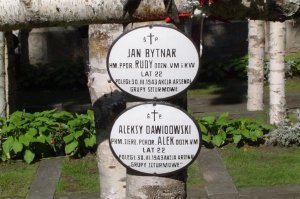
The tomb of Janek Bytnar "Rudy"
In the Ursynowska street Janek could see his mother before the death. Mrs. Zdzisława Bytnar got to know about the tragedy in Nowe Miasto. She also realized the condition of Janek. She arrived in Warsaw. Both women, the mother and the daughter, did not come back to the apartment in the Niepodległosci 159 street, never, till the end of the war. The Gestapo kept observing that apartment.
Mrs. Bytnar was accompanied by "Zoska" to the apartment in the Ursynowska street. Before entering a room where Janek was lying, Mrs. Bytnar heard these nice words of Tadeusz,
- "Mum, do everything you can not to show Janek your maternal tears. He is worried and so mentally crushed that if he saw you crying, the catastrophe could happen."
- "All right, my son, I won't cry."
Mrs. Bytnar, having entered the room, was sitting on a chair next to Janek and her pain did not allow her to speak to her own child. Janek was trying to talk his mother down. The mother replied and finally she asked the question,
- "Jasiu, I know, don't say anything. I see everything, I can see how much they tortured you but, Sonny, tell me what hurts you the most?"
And then "Rudy" showed her a little finger on his right hand, the only one which was not punctured with a nail.
- "It hurts me the most, Mum."
And then, just imagine, it was not possible for the mother to be at the funeral at Powazki. Everything had to be organized in a secret way. I can add that a part of the cemetery from the side of the Powazkowska street was prepared for graves of shot Germans. Our quarter A-20, fortunately, was the place of eternal rest for our boys who died during the occupation and particularly during the Warsaw Uprising.
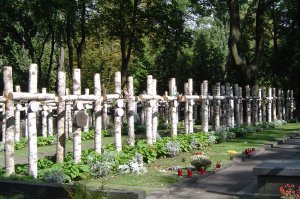
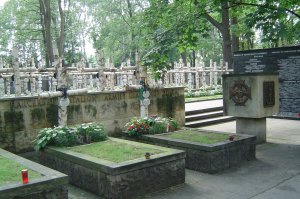
The Grey Regiments quarters 20A at the Powazki Military Cemetery
After the Arsenal action all the boys withdrew to the Old Town. There they started to count themselves and realized that Hubert was absent. Our secret service started to act. What had happened? He went to the gate. What could happen in that gate? Thanks to the investigation in the restaurants it was certain that he was driven from the restaurant to Aleja Szucha. And the decision was made that Mr. Erwin Sommer would have to be killed. Not only that man. On May 5, 1943 in the Mokotowska street number 6 the Gestapo man Schultz, who was beating Janek by means of an oak stick most often, was executed. On May 26, at the Three Crosses Square (Plac Trzech Krzyzy) Lange, who was beating Janek by means of a chain and was inserting nails under Janek's finger-nails, was killed. On July 18, 1943 on the railway station in Jozefow near Otwock Ernst Sommer, responsible for the death of Hubert Leng, was executed.
Mr. Sommer was being dealt with in a specific way. Our secret service established that he was hidden not in the restaurant in Warsaw but in Józefow. His residence, surrounded by high trees and bushes, which he would never leave, was being observed. But a disastrous for him day, July 18, came. At the Sommer's place there was a big party, with vodka, screaming and shooting. Sommer was sober to accompany his friends gendarmes and Gestapo men to the railway station but simultaneously he was drunk so much that his instinct let him down. When the train with drunk group of his companions drove off, Maciek Bittner approached him and administered justice. Sommer was shot.
Tadeusz was so crushed by the course of the action that he asked for a leave from the conspiracy work. He moved to Zalesie Dolne near Piaseczno, where he could come back to the mental balance step by step. He suffered enormously from the death of Janek and those words uttered by Professor Manteufl at the hospital and wanted to be far away from all that. But he did not laze. Spending time in Zalesie, he was writing a diary about his friendship with Janek, about planning the Arsenal action, and about its execution. In June 1943 he felt better and gave this diary to Aleksander Kaminski. And a month later the first edition of "Kamienie na szaniec" appeared. Its author was Juliusz Gorecki. This name was a pseudonym of Aleksander Kaminski. Subsequent editions were expanded and included descriptions of other armed actions which were numerous.
Tadeusz might have anticipated his coming death and he felt that these remembrances should be given to a proper person. On August 20, 1943, one month after the first edition of "Kamienie na szaniec" Tadeusz Zawadzki participated in the Sieczychy action. Sieczychy was a small village situated about 15-16 kilometers beyond Wyszkow. There was a guard place organized on an unlawful border between Eastern Prussia and GG (Generalna Gubernia) which was a country for the enslaved Polish people. Among 59 participants of that action only Tadeusz Zawadzki was shot and died immediately. Many remembrances left.
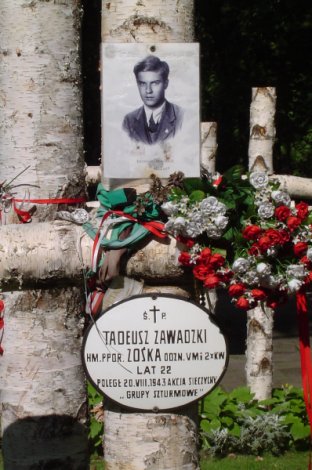
The tomb of Tadeusz Zawadzki "Zoska"
After his death, on September 1, 1943 r. a decision was made: the oldest grade of the Grey Regiments, Warsaw Assault Groups will be transformed into the Special Unit of the Home Army Headquarters "Jerzy". And then our two friends: Andrzej Romocki a.k.a. "Morro" and Andrzej Kuroszowski a.k.a. "Dlugi" reported a request. They wanted this newly-established battalion to get a cryptonym "Zoska". There is an order from September 1, 1943 r., in which lieutenant scoutmaster Ryszard Białous a.k.a. "Jerzy" decided to bring to life a scout battalion "Zoska". I was honoured to be on duty in this battalion.
While you are listening to the story of more than 80-year-old man, you have to remember that Staszek "Swist" not always had grey hair. In the year 1939 he passed an entrance exam to the secondary school. In the year 1944 he got on a Polish soldier's uniform. He was parading wearing this uniform for three months before the Uprising in the forests of Puszcza Biala near Wyszkow.
Three days before the Uprising I came back to Warsaw. I survived, yet wounded three times and miraculously saved. I was also saved from subsequent adventures in the People's Poland. In August 1953 I was looking at my mother sitting in the court and listening to judge's words,
- "The defendant Stanislaw Sieradzki, accused of crimes specified with the decree from October 1944 for the especially dangerous for the People's Poland, is being sentenced to death."
Oh, what I felt at that time, what I had to observe! My mother looked as if somebody had thrown flour at her. Being dark-haired, she became grey-haired at once. And I knew that the following words were to be uttered just in a while,
- "On the basis of the amnesty from the year 1947 the death sentence is being changed to 15 years of imprisonment."
I was to take a rest in "sanitariums" of the People's Poland for 8 years including 7 years in Wronki.
In June 1956, having spent 7,5 years .in a prison, I was called to a room of the prison's director. A public prosecutor, a representative of the General Public Prosecutor's Office from Warsaw welcomed me. He talked with me for two hours and addressed me in the following way,
- "Mr. Sieradzki".
It was hard for me to understand that because I had always heard this,
- "You bandit, you fascist, you will die here."
And suddenly the prosecutor said,
- "Mr. Sieradzki".
After two hours he stood up and shook my hand.
- "Mr. Sieradzki. I'm coming back to Warsaw and I'll give a proposal to release you from the prison. There is no basis to keep you in the prison."
A main reason to treat me as an enemy of the People's Poland was the fact that I twice accompanied my friends from "Zoska" battalion during the skiing holidays in Zakopane in the year 1945 and in Szklarska Poreba in the year 1946. The bandits were believed to go there and continue their enemy job against the People's Poland.
From June till October 1956 I was still waiting for the promised decision to be allowed to go home to my beloved mum. My mother, nota bene, was very courageous. She took part in the children's strike in Wrzesnia town. My beloved mother made me go to the secondary school, she made me become a scout. She was waiting for me the most.
Meanwhile, in October, during the morning exercise, being by the window with bars, I felt a strong prick in the left side of my breast. I fell on the floor. Water prepared for washing overflew. I was carried to the prison hospital in Wronki. Unfortunately, I met a bad doctor who would come there from outside. He stated that I had had a heart attack and ordered me to lie on my bed movelessly. According to him, I was to recover if I wanted that and try hard. I started to behave like he had said.
At the end of October a guard went to my prison infirmary.
- "Who of you is Sieradzki?"
I raised my hand. I was weak and choked. My left lung seemed not to have worked.
- "Get up, go to the hall, and dress. You will go to the director."
- "I am not allowed to get up. I have stayed here for one month now. I haven't got up yet. And I will not get up."
Few minutes later a higher in rank guard came.
- "Sieradzki, why don't you want to get up?"
- "Because the doctor forbad that. I am seriously ill, I had a heart attack."
- "Get up."
- "Leave me alone. I want to die at rest. I experienced a serious heart attack, don't prevent me from dying calmly."
A director's assistant, Mr. Krzyzaniak, came and told me,
- "Mr. Sieradzki, you must get up."
- "Why, director?"
- "I received a decision of the Supreme Court in Warsaw to release you from the prison and your mother is waiting for you outside the prison."
I had to recover, I had to get up, I had to dress. To kneel down before my mother and to lose consciousness. When I regained consciousness, doctors ran out of the prison and rescued me. My mother asked me,
- "Son, what shall we do?"
- "Mummy, we must go only to doctor Sieroszewski in Warsaw. He is our doctor from the occupation times, a cardiologist. He must have a look at my heart."
- "All right, sonny."
- "Mummy, look for a taxi, as quickly as possible. We are not waiting for a train."
A taxi driver from Wronki drove me to Warsaw to the Asfaltowa street. A dear man, he did not accept a payment for driving.
- "One does not take money from a prisoner."
I reached the second floor where Professor stayed himself, which was homicide. Put on a seat, I was examined in a detailed way. I remember that it was a very friendly examination. In the end Professor asked me,
- "Stasiu, who told you that you had had a heart attack?"
- "A doctor in Wronki who would come to the prison."
- "He was not a doctor but a medicaster. You do not have a left lung."
Then I realized that it was tuberculosis that had destroyed me. In the hall my mum was waiting and she was to hear that TB had devoured my lung. What I experienced at the time! I regretted my coming back. Why did I leave with this TB? Tearful, I lost consciousness. Having regained it, I saw stretcher on the floor and two medical orderlies.
Fastened to the stretcher I was carried to an ambulance. The car rushed with me to the Karolkowa street, in the corner of the Gorczewska street. There, outside the hospital, a female doctor was waiting for me, wearing a white gown. Today I know that she was informed by Professor who was being driver there and who needed her help. I was carried to X-ray and was fully examined. The doctor sat down on a chair next to me.
- "Mr. Stanislaw, you are said to have left the prison today."
- "Yes, that's true."
- "Where have you stayed?"
I replied that In the Mokotow prison for one year and then in Wronki for 7 years.
- "Did you stay in the prison for 8 years?"
- "Yes, correct."
- "You must stay alive. And for what were you in the prison?"
- "I was a Home Army soldier, a soldier of "Zoska" battalion and a participant of the Uprising.
The doctor stood above me.
- "Stasiu, did you know in the battalion "Zoska" a boy a.k.a. "Kuba"?"
He was a hero of the Arsenal action, my section commander during the Uprising. I did not know to whom I was uttering these words.
- "Doctor, "Kuba" was Konrad Okolski. I was a witness of his death on August 11 in the Kolska street in Wola. I saw how "Kuba" was dying.
And then I heard both my and the doctor's crying. It was Halina Okolski - the sister of "Kuba".
I survived in order to put on a scoutmaster's uniform. I was very active in the scouting and participated in many meetings with young people. Recently I have settled down a little.
Stanislaw Sieradzki
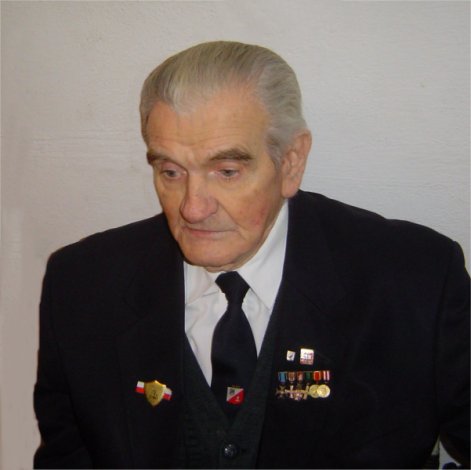
|
Stanislaw Sieradzki |
translation: Monika Alasa
Copyright © 2009 Maciej Janaszek-Seydlitz. All rights reserved.